

Universities and Unicorns: building digital assets in the higher education industry. Dr Janja Komljenovic, Director of the Centre for Higher Education Research and Evaluation at Lancaster, is leading a new project funded by an Economic and Social Research Council’s New Investigator grant, to put university staff and student digital data under the microscope from a financial perspective.

Universities collect unprecedented amounts of digital data from their students and staff, and they partner with the increasing number of platform companies and connect to the global digital infrastructure. Amidst important debates about data privacy, less attention has been given to data monetisation, ownership, and value redistribution. In other words, little is known about how data value is captured in the higher education sector, and about the various ways that digital data is made profitable. While education technology can bring many benefits to students, staff and universities, positive outcomes are far from automatic. Back to News. Non-institutional learning technologies, risks and responsibilities: a critical discourse analysis of university artefacts. Akande, A.
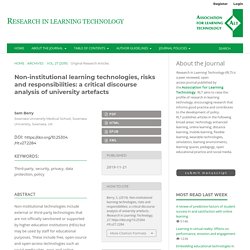
O. & Van Belle, J. (2016) ‘The use of software as a service by students in higher education institutions: a systematic literature review’, ACM Press, pp. 1–6. doi: 10.1145/2971603.2971604.Alim, F., et al., (2017) ‘Spying on students: school-issued devices and student privacy’, Electronic Frontier Foundation (EFF), [online] Available at: I., Kilicer, K. & Bardakci, S. (2015) ‘Effects of security and privacy concerns on educational use of cloud services’, Computers in Human Behavior, vol. 45, pp. 93–98. doi: 10.1016/j.chb.2014.11.075.Author (2019) ‘An investigation of medical students’ perception and willingness to use personal digital devices (PDDs) for classroom learning’, Manuscript in Preparation.Aymerich-Franch, L. & Fedele, M. (2014) ‘Students’ privacy concerns on the use of social media in higher education’, in Cutting-Edge Technologies and Social Media Use in Higher Education, eds V. Benson & S.
Do edtech apps keep student data safe? From in-class polling tools to university-wide learning management systems, software applications – apps – are ubiquitous on campuses nowadays.
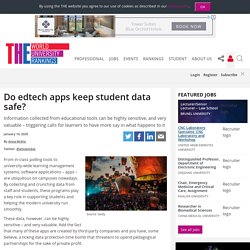
By collecting and crunching data from staff and students, these programs play a key role in supporting students and helping the modern university run smoothly. These data, however, can be highly sensitive – and very valuable. Add the fact that many of these apps are created by third-party companies and you have, some believe, a ticking data protection time bomb that threatens to upend pedagogical partnerships for the sake of private profit. “It’s everything from personal preferences, to knowledge levels, to the work [students] are physically doing that they submit through online portals. That information is owned, and it can be analysed,” said Pete Eyre, managing director of Vevox, a live polling and student engagement app that learners use anonymously, meaning their details can’t be harvested.
“The responsibility lies with the university. Being more human: rooting learning analytics through resistance and reconnection with the values of higher education: Higher Education Research & Development: Vol 39, No 1. Universities are now compelled to attend to metrics that (re)shape our conceptualisation of the student experience.
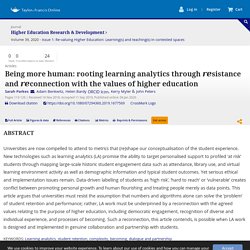
New technologies such as learning analytics (LA) promise the ability to target personalised support to profiled ‘at risk’ students through mapping large-scale historic student engagement data such as attendance, library use, and virtual learning environment activity as well as demographic information and typical student outcomes. Yet serious ethical and implementation issues remain. Is Learning Analytics Synonymous with Learning Surveillance, or Something Completely Different? – EduGeek Journal. It all started off simply enough.
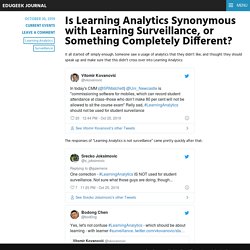
Someone saw a usage of analytics that they didn’t like, and thought they should speak up and make sure that this didn’t cross over into Learning Analytics: The responses of “Learning Analytics is not surveillance” came pretty quickly after that: But some disagreed with the idea, feeling they are very, very similar: Instructure Sale: Two large investors against deal and claiming conflicts of interest - PhilOnEdTech. Students or data subjects? What students think about university data security - HEPI.
Why parents in a school district near the CIA are forcing tech companies to erase kids’ data. Parents at a public school district in Maryland have won a major victory for student privacy: tech companies that work with the school district now have to purge the data they have collected on students once a year.
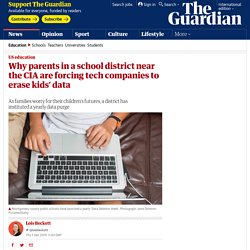
Experts say the district’s “Data Deletion Week” may be the first of its kind in the country. It’s not exactly an accident that schools in Montgomery county, in the suburbs of Washington DC, are leading the way on privacy protections for kids. The large school district is near the headquarters of the National Security Agency and the Central Intelligence Agency. New polling shows students need clarity on how universities use their data - HEPI. The Higher Education Policy Institute has published new research about students’ views on data security, Students or data subjects?
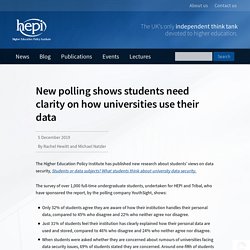
What students think about university data security. The survey of over 1,000 full-time undergraduate students, undertaken for HEPI and Tribal, who have sponsored the report, by the polling company YouthSight, shows: Only 32% of students agree they are aware of how their institution handles their personal data, compared to 45% who disagree and 22% who neither agree nor disagree.Just 31% of students feel their institution has clearly explained how their personal data are used and stored, compared to 46% who disagree and 24% who neither agree nor disagree.When students were asked whether they are concerned about rumours of universities facing data security issues, 69% of students stated they are concerned. Rachel Hewitt, HEPI’s Director of Policy and Advocacy, said: Michael Natzler, HEPI’s Policy Officer, said: Power to the People with Canvas Data and Analytics (Can You Dig It?) Since the initial launch of Canvas, we've been focused on delivering technology that makes teaching and learning easier for everyone.
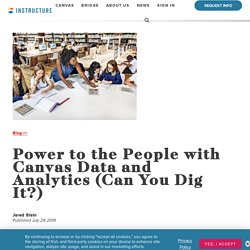
As schools increasingly adopted Canvas, teachers, researchers, and leaders have become passionate about leveraging the growing Canvas data to further improve teaching and learning. That passion became our priority, and over the years we've provided greater access to more data and designed new, easy-to-understand (and act on) course analytics. We've even occasionally shared data-driven insights about how Canvas course design, open capabilities, or video support teaching and learning. In short, we believe that Canvas data is for the benefit of Canvas users and institutions. We align our efforts to innovate with data to the goals and values we share with the education communities we serve. [LAK'18] March 9: Keynote - Neil Selwyn. 10. Five Dangers of Data-Informed Student Nudging. In 2016, leaked email exchanges from Mount St.
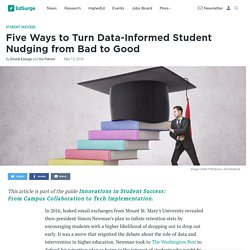
Mary’s University revealed then-president Simon Newman’s plan to inflate retention stats by encouraging students with a higher likelihood of dropping out to drop out early. It was a move that reignited the debate about the role of data and intervention in higher education. Newman took to The Washington Post to defend his retention plan as being in the interest of students who might be happier at a local, less expensive institution. That same academic year, Lone Star College-Montgomery was taking a different approach. Led by vice president of student affairs Michael Chavez, the college was using a predictive analytics platform from Civitas Learning to inform a targeted nudge campaign focused on increasing retention rates. Watch the EdSurge on-demand webinar, “How Analytics Can Support Student Success in Higher Ed,” sponsored by Salesforce.org. But nudges require an understanding of how and why people make the decisions they do. 1. 2. 3.
A Systematic Review of Empirical Studies on Learning Analytics Dashboards: A Self-Regulated Learning Perspective. Learning analytics discussion paper. Getting your organization's advanced analytics program right. How confident are you that your analytics initiative is delivering the value it’s supposed to?
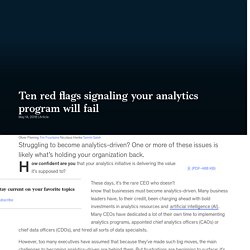
These days, it’s the rare CEO who doesn’t know that businesses must become analytics-driven. Many business leaders have, to their credit, been charging ahead with bold investments in analytics resources and artificial intelligence (AI). Demo. LA Ethics Discussion Paper. SHEILA framework – SHEILA. First version (July 2017) Second version (May 2018) – to be used along with the manual and handout of the SHEILA framework Third version – a web tool The SHEILA framework has been validated in various workshops (e.g., LAK’ 17&18, 13th EC-TEL, EUNIS learning analytics, ALASI, and SHEILA conferences) by 200 participants from across the world between March and November 2018.
It has also gone through a review process by external quality experts in two phases. The first quality review was provided by Niall Sclater, the Consultant and Director of Sclater Digital, and the recommendations in this report were addressed in this manual and handout of the SHEILA framework. As part of the process of consulting primary stakeholders (teachers and students), the SHEILA project developed survey and focus group instruments, which have been made available for institutions to better adopt the SHEILA framework:
iPASS Interim Report. Mollie Dollinger sur Twitter : "Curious about how co-creation in learning analytics would happen at scale? Want to know the difference between HCD, UCD and participatory design? Check our latest article @dannydotliu @NatashaArthars @jasonmlodge in @jla_ed. Snake oil or panacea: can technology improve student mental health? Rising numbers of student suicides and dramatic increases in demand for support services have led to claims of a university mental health crisis. Earlier this month, a survey revealed students were significantly more anxious than other young people. The issue has become a focus for regulator the Office for Students, which recently announced funding for projects investigating solutions.
Even Theresa May chose to spend her remaining time as prime minister announcing a £1m competition to come up with innovative ways of improving student mental health. Analytics, Interrupted. Predictive Learning Analytics 'At Scale': Guidelines to Successful Implementation in Higher Education. Moocs struggle to lift rock-bottom completion rates. Much of the early enthusiasm for massive open online courses, or Moocs, focused on how they could disrupt and democratise education — opening elite universities’ courses to the masses. They have long faced one stumbling block, however: barely anyone who starts a Mooc completes it. A recent study by academics at the Massachusetts Institute of Technology found that online courses had an astronomical dropout rate of about 96 per cent on average over five years. The research, which studied people who both registered and viewed a course by MIT and Harvard on their joint online learning platform, edX, also found that this figure had not improved between 2013-14 and 2017-18.
Given such alarming completion rates, have Moocs flopped? Anne Trumbore, senior director of Wharton Online, part of the University of Pennsylvania, says completion rates are the wrong measure of success. 25 Years of EdTech: 2014 – Learning analytics. [Continuing the 25 Years of Ed Tech series] Data, data, data. It’s the new oil and the new driver of capitalism, war, politics. So inevitably its role in education would come to the fore. Keele University - Funding success for learning analytics project. Capitalism’s New Clothes. In a series of remarkably prescient articles, the first of which was published in the German newspaper Frankfurter Allgemeine Zeitung in the summer of 2013, Shoshana Zuboff pointed to an alarming phenomenon: the digitization of everything was giving technology firms immense social power.
From the modest beachheads inside our browsers, they conquered, Blitzkrieg-style, our homes, cars, toasters, and even mattresses. Toothbrushes, sneakers, vacuum cleaners: our formerly dumb household subordinates were becoming our “smart” bosses. Their business models turned data into gold, favoring further expansion. Google and Facebook were restructuring the world, not just solving its problems. The general public, seduced by the tech world’s youthful, hoodie-wearing ambassadors and lobotomized by TED Talks, was clueless. This analytical error has also led many clever, well-intentioned people to insist that Silicon Valley should—and could—repent. That was scarcely surprising: Zuboff was no Marxist. Data protection. Are You Still There? How a ‘Netflix’ Model For Advising Lost Its Luster.
Learning Analytics Policy Development. Learninganalyticsprinciples. GDPR and Learning Analytics – Frequently Asked Questions. [LAK'18] March 9 - Session 7A2 - Sakinah Alhadad. Learning Agency, Not Analytics. I’m sitting watching this Coalition for Networked Information (CNI) presentation about learning analytics, and I’m cringing throughout. It’s so corporatized, so capitalist, so reductive. In fact, one of the slides in this presentation showcases a Gartner Business Information graph that correlates the progression of analytics sophistication to business value. Journal of Learning Analytics SI on GDPR. Notes and presentations from the 12th Learning Analytics Network meeting at the University of Greenwich. The University of Greenwich provided a great setting for our most recent UK Learning Analytics Network meeting on 23rd Nov 2017.
It is recorded in 3 sections: Part 1: David Maguire (the latter part of his address), Phil Richards, Rob Wyn Jones, Mark Harrington (40 mins 32 secs) General Data Protection Regulation (GDPR) Can you predict your students’ final grade at the start of the course? Yes, you can with Artificial Intelligence. They applied the calibrated model among the study population of almost 350 students, divided into 12 groups, from diverse courses and with different teachers. The results at the end of the school period in comparison with the prediction model were amazing.
» Publications. The Behavioural Insights Team Update Report 2016-17 This report sets out the latest findings from the Behavioural Insights Team and its global partners between September 2016 and August 2017. Improving engagement with pension decisions: The results from three randomised controlled trials. Critical Analytics: It’s Stories All the Way Down.
AI Now Institute 2017 Report. Where Are the Learning Sciences in Learning Analytics Research? – 3-Star learning experiences. Mirjam Neelen & Paul A. Kirschner. Standard. Me, my data and I: The future of the personal data economy. Missed our GDPR training? Watch it online for free! HeLFLearningAnalytics2017. 15% increase in top class university degrees. Howard Hall and David Cole Posted by Charley Rogers | September 17, 2017 | Technology. New IT system will identify failing university students. Aims. Journal of Learning Analytics. Learning Analytics Conference 05 07 2013. Student Engagement Attendance and Retention Monitoring Analytics Software. Jisc releases report on ethical and legal challenges of learning analytics. Learning analytics report. Privacy and the use of learning analytics.
Ethical use of Student Data for Learning Analytics Policy. Student app for learning analytics: functionality and wireframes. Visions of the Future of Learning Analytics. Early Alert of Academically At-Risk Students: An Open Source Analytics Initiative. Learning Analytics briefing for SUs. Mike Sharkey paper. Frombrickstoclicks hecreportforweb. Learning analytics should not promote one size fits all: The effects of instructional conditions in predicting academic success. Learning analytics in higher education. Learner Analytics Webinar. Toward evidence-based learning analytics: Using proxy variables to improve asynchronous online discussion environments. Vol-1596 - LAL 2016 - Workshop on Learning Analytics for Learners. Learning analytics in he v3 (1) BIT Publication EAST FA WEB. Journal of Computer Assisted Learning - Volume 32, Issue 3 - Learning Analytics in Massively Multi-User Virtual Environments and Courses.
The Promise and Peril of Predictive Analytics in Higher Education. Learning Analytics: Insight papers released. Student Attitudes toward Learning Analytics in Higher Education: “The Fitbit Version of the Learning World” Learning analytics and student success. Learning Analytics Explained – Learning Innovation. 7 tips for developing a learning analytics policy. Learning Analytics in Higher Education—A Literature Review.
Handbook of Learning Analytics (open) Learning Analytics vs Cognitive Automation. Where is the evidence? A call to action for learning analytics. Time for Analytics of the Oppressed? – my starter for 10 for #digifest debate – howsheilaseesIT. Hey vendors! Stop calling what you’re selling colleges and universities “Predictive Analytics” – 21stcenturyhighered. Do notifications get noticed? New study finds that embedded alerts to students promote action at high rates. Learning Analytics Courses.